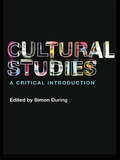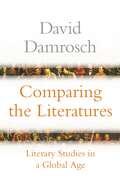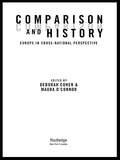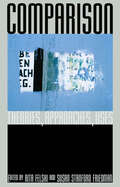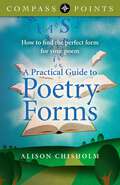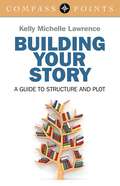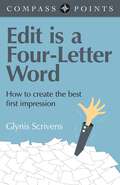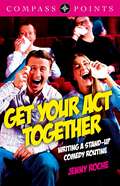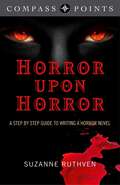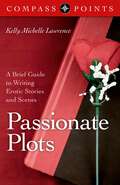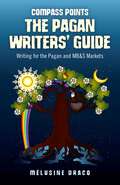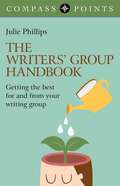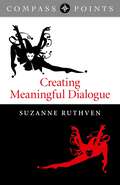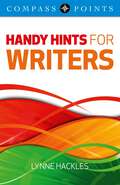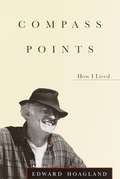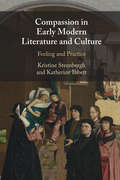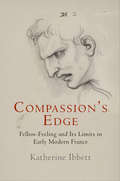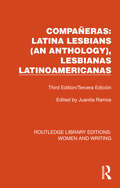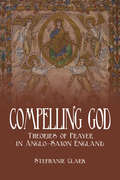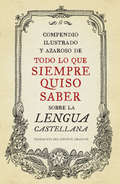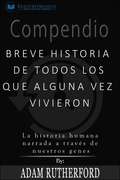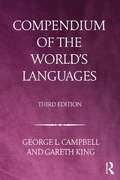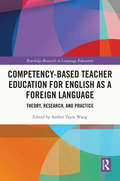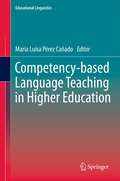- Table View
- List View
Comparing Texts (Routledge A Level English Guides)
by Nicola OnyettRoutledge A Level English Guides equip AS and A2 Level students with the skills they need to explore, evaluate, and enjoy English. Books in the series are built around the various skills specified in the assessment objectives (AOs) for all AS and A2 Level English courses.Focusing on the AOs most relevant to their topic, the books help students to develop their knowledge and abilities through analysis of lively texts and contemporary data. Each book in the series covers a different area of language and literary study, and offers accessible explanations, examples, exercises, summaries, suggested answers and a glossary of key terms. Comparing Texts: provides students with the skills they need to compare and contrast texts explores and compares texts from a wide range of genres and periods draws on a large number of literary and non-literary texts, from Chaucer's Wife of Bath to The Good Wife's Guide, from Frankenstein to poetry by Carol Ann Duffy, and from Nigella Lawson to Fast Food Nation introduces the main themes and issues students need to consider when comparing texts: themes, genre, time and place, form and structure, and intertextuality.
Comparing the Literatures: Literary Studies in a Global Age
by David DamroschFrom a leading figure in comparative literature, a major new survey of the field that points the way forward for a discipline undergoing rapid changesLiterary studies are being transformed today by the expansive and disruptive forces of globalization. More works than ever circulate worldwide in English and in translation, and even national traditions are increasingly seen in transnational terms. To encompass this expanding literary universe, scholars and teachers need to expand their linguistic and cultural resources, rethink their methods and training, and reconceive the place of literature and criticism in the world. In Comparing the Literatures, David Damrosch integrates comparative, postcolonial, and world-literary perspectives to offer a comprehensive overview of comparative studies and its prospects in a time of great upheaval and great opportunity.Comparing the Literatures looks both at institutional forces and at key episodes in the life and work of comparatists who have struggled to define and redefine the terms of literary analysis over the past two centuries, from Johann Gottfried Herder and Germaine de Staël to Edward Said, Gayatri Spivak, Franco Moretti, and Emily Apter. With literary examples ranging from Ovid and Kālidāsa to James Joyce, Yoko Tawada, and the internet artists Young-Hae Chang Heavy Industries, Damrosch shows how the main strands of comparison—philology, literary theory, colonial and postcolonial studies, and the study of world literature—have long been intertwined. A deeper understanding of comparative literature's achievements, persistent contradictions, and even failures can help comparatists in literature and other fields develop creative responses to today's most important questions and debates.Amid a multitude of challenges and new possibilities for comparative literature, Comparing the Literatures provides an important road map for the discipline's revitalization.
Comparison and History: Europe in Cross-National Perspective
by Deborah Cohen Maura O’connorFirst published in 2004. Routledge is an imprint of Taylor & Francis, an informa company.
Comparison: Theories, Approaches, Uses
by Rita Felski & Susan Stanford FriedmanAn extended volume of New Literary History that considers the practice of comparison in literary studies and other disciplines within the humanities.Writing and teaching across cultures and disciplines makes the act of comparison inevitable. Comparative theory and methods of comparative literature and cultural anthropology have permeated the humanities as they engage more centrally with the cultural flows and circulation of past and present globalization. How do scholars make ethically and politically responsible comparisons without assuming that their own values and norms are the standard by which other cultures should be measured? Comparison expands upon a special issue of the journal New Literary History, which analyzed theories and methodologies of comparison. Six new essays from senior scholars of transnational and postcolonial studies complement the original ten pieces. The work of Gayatri Chakravorty Spivak, Ella Shohat, Robert Stam, R. Radhakrishnan, Bruce Robbins, Ania Loomba, Haun Saussy, Linda Gordon, Walter D. Mignolo, Shu-mei Shih, and Pheng Cheah are included with contributions by anthropologists Caroline B. Brettell and Richard Handler. Historical periods discussed range from the early modern to the contemporary and geographical regions that encompass the globe. Ultimately, Comparison argues for the importance of greater self-reflexivity about the politics and methods of comparison in teaching and in research.
Compass Points - A Practical Guide to Poetry Forms: How To Find The Perfect Form For Your Poem
by Alison ChisholmA Practical Guide to Poetry Forms is a practical handbook on poetry forms, giving informative details on the construction of the major set forms. It also includes exercises, all within the scope of the beginner, yet stimulating enough to engage the more experienced poet.
Compass Points - Building Your Story: A Guide to Structure and Plot
by Kelly LawrenceA lively and comprehensive guide on the importance of structuring your plot with in-depth looks at different techniques and lots of practical advice, including at least one writing exercise in each chapter on topics such as building tension, staging drama, identifying and rectifying structural issues and internal and external plot journeys. So if you're struggling with structure or grappling with your plot points, this up-to-date and informative book is a terrific aid for both emerging and established writers alike.
Compass Points - Edit is a Four-Letter Word: How to Create the Best First Impression
by Glynis ScrivensA one-stop refresher course in editing fiction, suitable for both new writers and more experienced ones. When to edit, how to edit, why to edit – and when not to edit. The different stages of editing. Checklists, examples, and advice from other writers, editors, competition judges and a literary agent.
Compass Points - Get Your Act Together: Writing A Stand-up Comedy Routine
by Jenny RocheConfidence is essential for any stand--up comic and having confidence in your material is the first step to having greater confidence on stage. It is said that proper preparation makes for professional performance and this book provides the tools to achieve this, offering down-to-earth practical advice and a logical progression from identifying your stage persona, thinking about your audience and the craft of honing comedy material to fit your persona and audience, through to structuring your stand-up set, preparing for when things might go wrong, and last but not least -- progressing your career. Get Your Act Together is a book for anyone who wants to be serious about becoming a stand-up comic and wants to do it well.
Compass Points - Horror Upon Horror: A Step by Step Guide to Writing a Horror Novel
by Suzanne RuthvenThe horror novel has often been looked upon as the poor relation in the literary world, and yet some of our greatest writers have published novels under its banner. Horror writer (Whittlewood and The Wild Horseman) and former Gothic Society member, Suzanne Ruthven brings us a step-by-step guide to writing horror fiction.
Compass Points - Passionate Plots: A Brief Guide to Writing Erotic Stories and Scenes
by Kelly LawrenceNew and emerging writers, existing writers looking to expand their skills and readers of erotic literature interested in writing their own stories will find this book a lively and informative "how to" on writing erotica. Written by a published author, Passionate Plots focuses upon plot and crafting integral erotic scenes, with practical exercises for the reader.
Compass Points - The Pagan Writers' Guide: Writing for the Pagan and MB&S Publications
by Suzanne RuthvenI want to be a pagan author and write for the pagan community...can you tell me how to get published? Writing for the pagan community is no different from writing for any other readership -- but we need to learn the basic rules before deciding whether we have any talent worth pursuing. Regardless of our own personal levels of esoteric learning, we need to go back to the basics of creative writing and see what tricks of the trade we can utilise. We will see why editors and publishers are inundated with submissions of a certain kind -- and what we can do to give our writing 'editor appeal'. We will learn how to develop ideas via lateral thinking, and develop the art of 'seeing' through an editor's eyes.
Compass Points - The Writers' Group Handbook: Getting the Best For and From Your Writing Group
by Julie PhillipsOver the past 15 years Julie Phillips has been and still is a member of many different groups and committees including: writing groups, Parent/Teacher Associations, local community campaign committees, Scout committees, School Governor Committees, various further education groups and nursing groups. She has probably seen it all when it comes to how groups work and how they can come off the tracks. With her experience and insider knowledge on how good groups function she has crammed all she knows about making groups work well into this book. She's done the leg work so you don't have to fall into the traps loitering within unsuspecting writing groups.
Compass Points: Creating Meaningful Dialogue
by Suzanne RuthvenPoor dialogue is one of the main reasons for a publisher&’s reader glazing over when reading a first-time novel, where the author has seen fit to include every superfluous utterance of every-day speech. The purpose of dialogue is to move the story along and to give added dimension to the characters through what they say, and often think. Creating Meaningful Dialogue helps to get rid of the dross from your typescript and retain the gold in the story. Try to incorporate the exercises given at the end of each chapter into your own writing where appropriate and see how it improves the flow of the dialogue by making the characters come alive. With added input from publishers and publisher&’s readers, this book is invaluable for all would-be novelists and fiction writers.
Compass Points: Handy Hints for Writers
by Lynn HacklesHandy Hints for Writers is a book of tips, advice and encouragement for writers at all levels. Dip into it or read from start to finish and you will find something to inspire you, make you think, give you a kick start or make you smile.
Compass Points: How I Lived
by Edward Coolbaugh HoaglandIn "Compass Points", Hoagland looks back over his life in an attempt to discern the fundamental directions in which he is traveling, and he tells a story that embraces some of the contradictions and complexities of human experience. It reflects with elegance Hoagland's intransigent honesty, his protean ardor, and, most important, his generosity. Here, family and friends, wives and lovers, mentors and fellow writers are given their due in a life's reckoning that is shrewd in observation, marvelously crafted, rapturous in its acceptance and appreciation. A pithy mix of family history and personal insight, "Compass Points" transforms one man's story into an American saga.
Compassion in Early Modern Literature and Culture: Feeling and Practice
by Katherine IbbettThis collection is an enquiry into compassion as an early modern emotional phenomenon, situating it within the complexity of European economic, social, cultural and religious tensions. Drawing on recent work in the history of emotions, leading scholars consider the particularities of early modern compassion, demonstrating its entanglements with diverse genres and geographies. Chapters on canonical and less familiar works explore tragedy, comedy, sermons, philosophy, treatises on consolation, medical writing, and dramatic theory, showing how early modern compassion shaped attitudes and social structures that remain central to the way we imagine our response to suffering today, and how such investigations can ultimately provoke new ways of thinking about community in contemporary Europe.
Compassion's Edge: Fellow-Feeling and Its Limits in Early Modern France (Haney Foundation Series)
by Katherine IbbettCompassion's Edge examines the language of fellow-feeling—pity, compassion, and charitable care—that flourished in France in the period from the Edict of Nantes in 1598, which established some degree of religious toleration, to the official breakdown of that toleration with the Revocation of the Edict in 1685. This is not, however, a story about compassion overcoming difference but one of compassion reinforcing division: the seventeenth-century texts of fellow-feeling led not to communal concerns but to paralysis, misreading, and isolation. Early modern fellow-feeling drew distinctions, policed its borders, and far from reaching out to others, kept the other at arm's length. It became a central feature in the debates about the place of religious minorities after the Wars of Religion, and according to Katherine Ibbett, continues to shape the way we think about difference today.Compassion's Edge ranges widely over genres, contexts, and geographies. Ibbett reads epic poetry, novels, moral treatises, dramatic theory, and theological disputes. She takes up major figures such as D'Aubigné, Montaigne, Lafayette, Corneille, and Racine, as well as less familiar Jesuit theologians, Huguenot ministers, and nuns from a Montreal hospital. Although firmly rooted in early modern studies, she reflects on the ways in which the language of compassion figures in contemporary conversations about national and religious communities. Investigating the affective undertow of religious toleration, Compassion's Edge provides a robust corrective to today's hope that fellow-feeling draws us inexorably and usefully together.
Compañeras: Third Edition/Tercera Edición (Routledge Library Editions: Women and Writing)
by Ramos JuanitaOriginally published in 1987 and revised in 2004, Compañeras speaks with the voices of Latina lesbians who are puertorriqueñas, chicanas, cubanas, chilenas, hondureñas, brasileñas, colombianas, argentinas, peruanas, costarricenses, mexicanas, ecuatorianas, bolivianas, dominicanas, and nicaragüenses; women who met to speak about what it implies to be both Latina and lesbian in our communities, whether we live in Latin America or the US. Each time a woman begins to speak, a liberating process begins, one that is unavoidable and has powerful political implications. In these pages we see repeated the process of self-discovery, of affirmation in coming out of the closet, the search for a definition of our identity within the family and our community, the search for answers, for meaning in our personal struggle, and the commitment to a political struggle to end all forms of oppression. The stages of increasing awareness become clear when we begin to recount the story of our lives to someone else, someone who has experienced the same changes. When we write or speak about these changes, we establish our experience as valid and real, we begin to analyze, and that analysis gives us the necessary perspective to place our lives in a context where we know what to do next. Compañeras becomes an instrument of unity, a political tool. Compañeras habla a través de la voz de lesbianas latinoamericanas, chicanas, puertorriqueñas, cubanas, chilenas, hondureñas, brasileñas, colombianas, argentinas, peruanas, costarricense, mexicanas, ecuatorianas, bolivianas, dominicanas, y nicaragüenses; mujeresque se encontraron para hablar sobre lo que significa en nuestra comunidad ser ambas cosas, latinoamericanas y lesbianas, sea que vivamos en América Latina o en los Estados Unidos. Cada vez que una mujer comienza a hablar, comienza el proceso de liberación; es algo inevitable que tiene implicaciones politicas ponderosas. En estas paginas vemos repetido nuestro propio proceso de descubrimiento, la afirmación al asumirnos ante los demás, la búsqueda de una definición de identidad dentro de la familia y de nuestra comunidad, la búsqueda de repuestas significativas a las muchas personales y el compromise en la lucha politica para acabar con toda forma de opresión. Las etapas de crecimiento o de desarrollo de nuestra conciencia se hacen claras cuando comenzamos a reecontar la historia de nuestras vidas en alguien más, alguien que ha experimentado los mismos cambios. Cuando hablamos sobre estos cambios afirmamos nuestra experienca como válida y real, y ese análisis nos da la perspectiva necesaria para colocar neustras vidas dentro de un context que nos permita saber cuál es el próximo paso que temenos que dar. Compañeras viene a ser un instrument de unidad, una herramienta politica.
Compelling God: Theories of Prayer in Anglo-Saxon England (Toronto Anglo-Saxon Series)
by Stephanie ClarkWhile prayer is generally understood as "communion with God" modern forms of spirituality prefer "communion" that is non-petitionary and wordless. This preference has unduly influenced modern scholarship on historic methods of prayer particularly concerning Anglo-Saxon spirituality. In Compelling God, Stephanie Clark examines the relationship between prayer, gift giving, the self, and community in Anglo-Saxon England. Clark’s analysis of the works of Bede, Ælfric, and Alfred utilizes anthropologic and economic theories of exchange in order to reveal the ritualized, gift-giving relationship with God that Anglo-Saxon prayer espoused. Anglo-Saxon prayer therefore should be considered not merely within the usual context of contemplation, rumination, and meditation but also within the context of gift exchange, offering, and sacrifice. Compelling God allows us to see how practices of prayer were at the centre of social connections through which Anglo-Saxons conceptualized a sense of their own personal and communal identity.
Compendio ilustrado y azaroso de todo lo que siempre quiso saber sobre la lengua castellana
by FundéuUna cuidada antología de rarezas, curiosidades y conocimientos útiles del lenguaje. «La palabra, la lengua, es la casa del ser. En su morada habita el hombre.»Heidegger La herramienta más antigua de que disponemos es también la que usamos con mayor frecuencia: el lenguaje. Sin embargo, dedicamos muy poco tiempo a reflexionar sobre él, a cuidarlo y repararlo. Fundéu, la Fundación del Español Urgente, es el servicio filológico de la Agencia EFE, con una larga y prestigiosa trayectoria cuidando el lenguaje que utilizan los periodistas de la Agencia (el Manual del español urgente es un título clásico). Desde hace unos años, Fundéu ha tenido un espectacular eco en Internet, con una extraordinaria página web y una cuenta muy seguida en Twitter que responde a todo tipo de consultas y dudas y hace fascinantes recomendaciones sobre el correcto uso del lenguaje. Este compendio presenta de forma amena y atractiva el conocimiento que emite Fundéu, las dudas resueltas y busca difundir el amor por el idioma, sus características y sus rarezas.
Compendio: La historia humana narrada a través de nuestros genes
by Adam RutherfordEl poder del ADN y la información que contiene, son inmensos. Imagine usar esa información para descubrir nuestro pasado. En nuestros genomas, cada uno de nosotros llevamos la historia de nuestra especie: nacimientos, fallecimientos, enfermedades, guerra, hambruna, migración y sexo. Somos mucho más que nuestro ADN, pero este contiene la llave de nuestro pasado. "Esta es una historia acerca de usted. Trata sobre la historia de quién es usted y cómo llegó a ser lo que es" - Adam Rutherford.
Compendium of the World's Languages
by Gareth King George L. CampbellThis third edition of Compendium of the World’s Languages has been thoroughly revised to provide up-to-date and accurate descriptions of a wide selection of natural language systems. All cultural and historical notes as well as statistical data have been checked, updated and in many cases expanded. Presenting an even broader range of languages and language families, including new coverage of Australian aboriginal languages and expanded treatment of North American and African languages, this new edition offers a total of 342 entries over nearly 2000 pages. Key features include: Complete rewriting, systematization and regularisation of the phonology sections Provision of IPA symbol grids arranged by articulatory feature and by alphabetic resemblance to facilitate use of the new phonology sections Expansion of morphology descriptions for most major languages Provision of new illustrative text samples Addition of a glossary of technical terms and an expanded bibliography Comparative tables of the numerals 1-10 in a representative range of languages, and also grouped by family Drawing upon a wealth of recent developments and research in language typology and broadened availability of descriptive data, this new incarnation of George Campbell’s astounding Compendium brings a much-loved survey emphatically into the twenty-first century for a new generation of readers. Scholarly, comprehensive and highly accessible, Compendium of the World’s Languages remains the ideal reference for all interested linguists and professionals alike.
Compensatory Lengthening: Phonetics, Phonology, Diachrony (Outstanding Dissertations in Linguistics)
by Darya KavitskayaFirst Published in 2002. Routledge is an imprint of Taylor & Francis, an informa company.
Competency-Based Teacher Education for English as a Foreign Language: Theory, Research, and Practice (Routledge Research in Language Education)
by Amber Yayin WangProviding a series of chapters, written by teacher educators in three continents, this edited volume explores the concepts, challenges, possibilities, and implementations of competency-based instruction for developing English competencies in English as a foreign language (EFL) contexts. Recent trends in education have emphasized the need to develop competencies that connect learning with real-life performances. This need has brought about a massive increase in the number of studies and scholarly works devoted to research into competency-based education. However, for teachers and learners of EFL, it is challenging to develop competencies for using a language that does not seem to connect with their real-life scenarios. The chapters apply the concept of competency-based instruction in different EFL contexts and are structured around three themes: Theory: current thoughts on theories of competency-based education Research: empirical research on competency-based teacher education Practice: integrating competency-based instruction into teacher education This book offers examples of competency-based EFL teacher education through both research and practical applications. In addition to the innovation in competency approaches, the inclusion of language learning in virtual environments offers a valuable resource for scholars, educators, researchers, and all those concerned with current and future education.
Competency-based Language Teaching in Higher Education (Educational Linguistics #14)
by María Luisa Pérez CañadoSpanning the divide between the theory and praxis of competency-based teaching in tertiary language education, this volume contains invaluable practical guidance for the post-secondary sector on how to approach, teach, and assess competencies in Bologna-adapted systems of study. It presents the latest results of prominent European research projects, programs of pedagogical innovation, and thematically linked academic networks. Responding to a profound need for a volume addressing the practical aspects of the newly designed language degrees now being rolled out across Europe, this essential contribution pools the insights of a prestigious set of scholars, practitioners, and policy makers from diverse parts of Europe and the US. It will inform crucial decisions about instituting and evaluating competencies in a new generation of language studies programmes.
